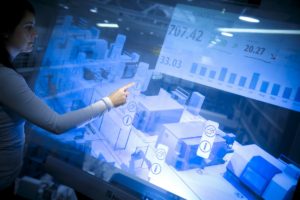Educators focus on teaching skills to help students master both physical and virtual worlds
Blog: Apriso Blog

DRESDEN, GERMANY – MARCH 12: E3-research factory of the Fraunhofer Institute for Machine Tools and Forming Technology in Chemnitz working on a research project Smarpro (Smart Assistance for Humans in Production Systems) on March 12, 2015. An employee of the Institute operates a touch screen monitor. (Photo by Ute Grabowsky / photo library via Getty Images)
Manufacturers are increasingly using new technologies, including the Industrial Internet of Things, robotics and additive manufacturing, to eliminate waste and raise productivity. But educators are challenged to train the new workforce and retrain existing ones with the skills they need to work successfully in these factories of the future.
In the factory of the future – also known as the smart factory or Industry 4.0 – people and technology work together in an environment that seamlessly combines virtual and physical worlds, all aimed at improving efficiency and sustainability.
“The combination of ‘virtual’ and ‘real’ in order to get a full view of the complete value chain will allow factories to produce more rapidly, more efficiently and with greater output using fewer resources,” according to the International Electrotechnical Commission (IEC), a Switzerland-based international technology standards organization, in its “Factory of the Future” white paper.
While the vision may be futuristic, it’s already paying off for the world’s most advanced manufacturers. The American Society for Quality’s “2014 Manufacturing Outlook Survey” found that 82% of organizations that had implemented smart manufacturing reported increased efficiency, 49% said they experienced fewer product defects and 45% said they had increased customer satisfaction.
For all manufacturers to benefit from the factory of the future, however, requires “highly skilled technical talent,” the IEC advised – workers who can understand and manipulate virtual models of the physical environment. That represents a challenge for educators, and some of the world’s top technical training institutions are adopting new approaches to helping workers develop the skills demanded by futuristic factories.
Preparing for Industry 4.0
The concept of smart factories or Industry 4.0, conceived in Germany as “Industrie 4.0,” has demanded new ways of thinking about both manufacturing and education.
“We face the same challenge in our curricula as the industry does with its production processes,” said Vera Hummel, professor of Logistics and Industrial Engineering at ESB Business School at Reutlingen University in Germany. “Industry 4.0 is not simply about production efficiency. It is also about how you can build up new business models based on dedicated technologies. By understanding the potential of digital transformation and of the integration of the physical factory with the real-time digital image, which bi-directionally maps the virtual and the real world, students will be prepared to become the future experts of our economy.”
For students, this entails learning three nontraditional skills.
“The first challenge for students is learning to use the hybrid working system in combination with the technical assistance and cyberphysical systems,” Hummel said.
“The second is the seamless digital engineering environment. In the past, students only had to work with either CAD, process engineering or robot simulations, but now they have to work with all of these digital tools, which support advanced, world-class production technologies in a seamless development process. The third challenge is learning to manage intelligent products based on highly diverse customer requirements in self-steering production systems.”
Teaching those skills demands a move away from traditional classes, where subjects are separated by discipline, to give students a comprehensive understanding of the interrelationships and dependencies among mechanical, informatics and automation processes, Hummel said.
Master’s degree students, therefore, spend two days a week for 15 weeks working on projects in a specially constructed “ESB Learning Factory,” which combines the physical infrastructure for production with cloud- based tools for digital engineering. “They learn how to handle big data, digital processes, new business models and new cooperation models between departments,” Hummel said. “Our vision is to create a future-oriented ESB learning factory that will give the students hands-on experience with the world’s newest technologies in the context of Industry 4.0.”
Continue reading the rest of this story here, on COMPASS, the 3DEXPERIENCE Magazine
Leave a Comment
You must be logged in to post a comment.







